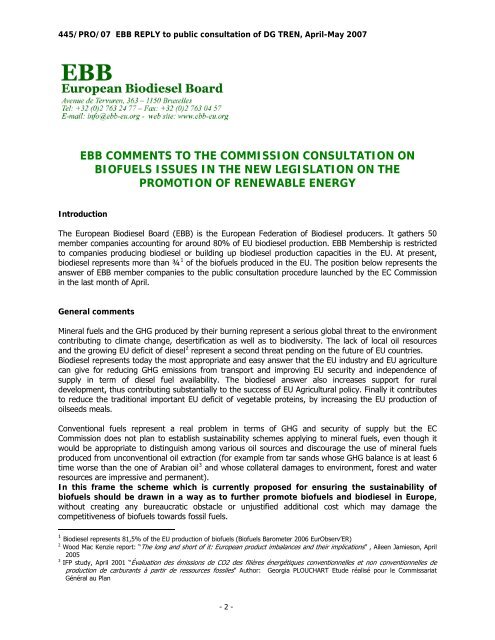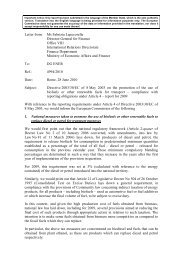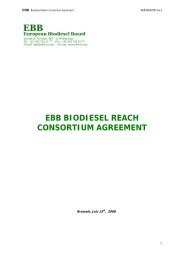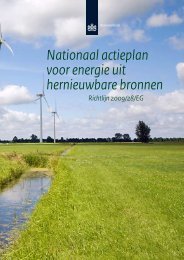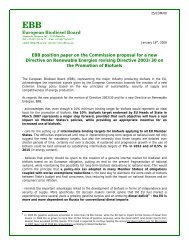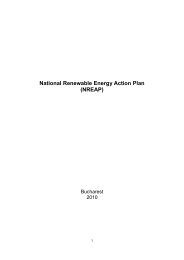EBB - European Biodiesel Board
EBB - European Biodiesel Board
EBB - European Biodiesel Board
Create successful ePaper yourself
Turn your PDF publications into a flip-book with our unique Google optimized e-Paper software.
445/PRO/07 <strong>EBB</strong> REPLY to public consultation of DG TREN, April-May 2007<br />
<strong>EBB</strong> COMMENTS TO THE COMMISSION CONSULTATION ON<br />
BIOFUELS ISSUES IN THE NEW LEGISLATION ON THE<br />
PROMOTION OF RENEWABLE ENERGY<br />
Introduction<br />
The <strong>European</strong> <strong>Biodiesel</strong> <strong>Board</strong> (<strong>EBB</strong>) is the <strong>European</strong> Federation of <strong>Biodiesel</strong> producers. It gathers 50<br />
member companies accounting for around 80% of EU biodiesel production. <strong>EBB</strong> Membership is restricted<br />
to companies producing biodiesel or building up biodiesel production capacities in the EU. At present,<br />
biodiesel represents more than ¾ 1 of the biofuels produced in the EU. The position below represents the<br />
answer of <strong>EBB</strong> member companies to the public consultation procedure launched by the EC Commission<br />
in the last month of April.<br />
General comments<br />
Mineral fuels and the GHG produced by their burning represent a serious global threat to the environment<br />
contributing to climate change, desertification as well as to biodiversity. The lack of local oil resources<br />
and the growing EU deficit of diesel 2 represent a second threat pending on the future of EU countries.<br />
<strong>Biodiesel</strong> represents today the most appropriate and easy answer that the EU industry and EU agriculture<br />
can give for reducing GHG emissions from transport and improving EU security and independence of<br />
supply in term of diesel fuel availability. The biodiesel answer also increases support for rural<br />
development, thus contributing substantially to the success of EU Agricultural policy. Finally it contributes<br />
to reduce the traditional important EU deficit of vegetable proteins, by increasing the EU production of<br />
oilseeds meals.<br />
Conventional fuels represent a real problem in terms of GHG and security of supply but the EC<br />
Commission does not plan to establish sustainability schemes applying to mineral fuels, even though it<br />
would be appropriate to distinguish among various oil sources and discourage the use of mineral fuels<br />
produced from unconventional oil extraction (for example from tar sands whose GHG balance is at least 6<br />
time worse than the one of Arabian oil 3 and whose collateral damages to environment, forest and water<br />
resources are impressive and permanent).<br />
In this frame the scheme which is currently proposed for ensuring the sustainability of<br />
biofuels should be drawn in a way as to further promote biofuels and biodiesel in Europe,<br />
without creating any bureaucratic obstacle or unjustified additional cost which may damage the<br />
competitiveness of biofuels towards fossil fuels.<br />
1 <strong>Biodiesel</strong> represents 81,5% of the EU production of biofuels (Biofuels Barometer 2006 EurObserv’ER)<br />
2 Wood Mac Kenzie report: “The long and short of it: <strong>European</strong> product imbalances and their implications” , Aileen Jamieson, April<br />
2005<br />
3<br />
IFP study, April 2001 “Évaluation des émissions de CO2 des filières énergétiques conventionnelles et non conventionnelles de<br />
production de carburants à partir de ressources fossiles” Author: Georgia PLOUCHART Etude réalisé pour le Commissariat<br />
Général au Plan<br />
- 2 -


